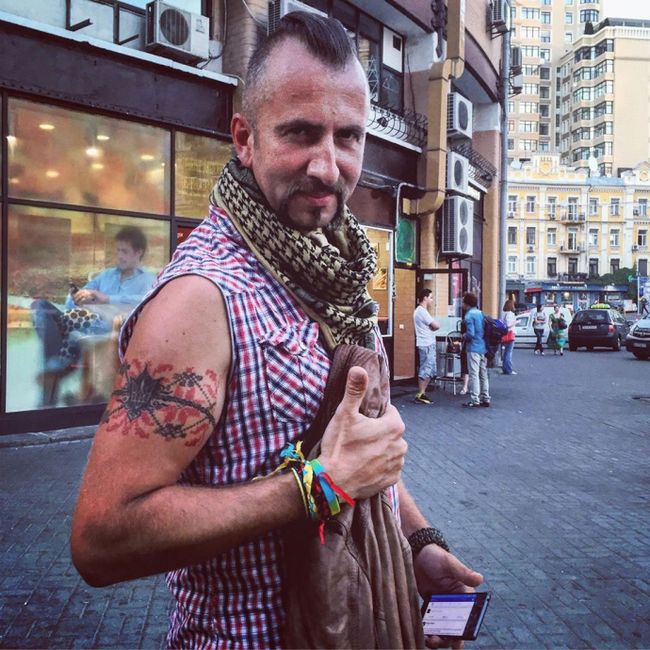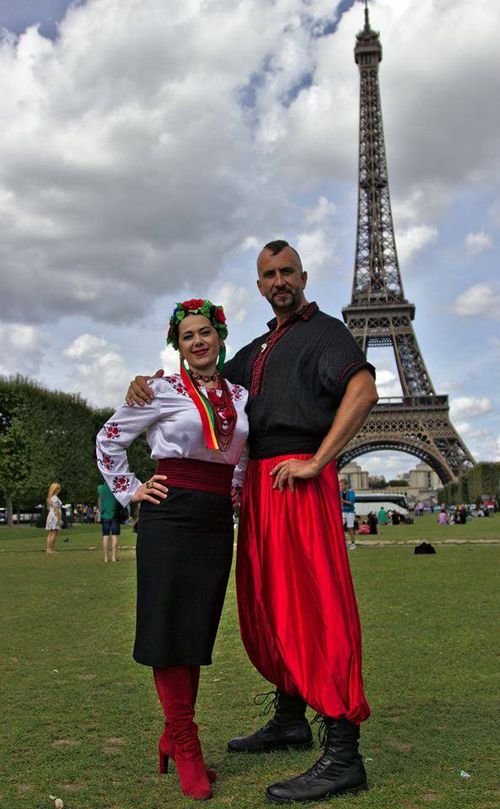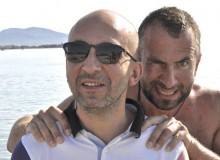A grand concert will be held on April 28 as part of the 9th International Paschal Assembly “Spirituality Unites Ukraine,” and a commemorative plaque will be unveiled near the entrance to the Main Hall of the National Music Academy of Ukraine, which says that this hall has been named after an outstanding Ukrainian, a patriot, and an opera singer who was killed in the ATO.
The Day interviewed Vasyl’s elder brother Orest who shared his reminiscences, opinions, and plans for the future about honoring the memory and continuing the cause of Vasyl Slipak.
“OUR FAMILY IS SCATTERED ALL OVER THE WORLD NOW”
Orest, would you tell us about your family?
“We have a very big family. It is scattered all over the world now – France, Argentina, Austria, the Czech Republic, Slovakia. We have a lot of roots, both paternal and maternal. Mother is engineer by education, a very honest and conscientious person. Our family is closely linked to glass production in Ukraine. The uncle built and opened Lviv’s first fancy glass workshop of the National Academy of Arts. Mother’s sister worked at a glass-making factory as chemical laboratory chief and mother as a design bureau employee, while father was a production process specialist.”
In other words, none of the family members had anything to do with music?
“Mother once said our grandfather Vasyl, after whom my brother was named, had sung very well and been a very interesting person in general. So it is believed that Vasyl inherited his talent. He supposedly had a unique voice.”
Were there two brothers in the family?
“Yes, with an age difference of 6 years. I, a cardiologist by education, have worked at Western pharmaceutical companies in all my lifetime. I dealt with educational programs for Ukrainian doctors. We applied the treatment techniques that had never been used in Ukraine. I work now as an independent business consultant in various fields.”
Vasyl confessed in an interview that it was you who took him to Dudaryk Choir. Why there, of all places?
“Because he used to sing all the time and something was to be done with this. Vasyl was already 12, and I told parents that if the boy did not study seriously, he would waste his talent. Dudaryk was a very high standard at the time. Although the brother was formally too ‘old’ to qualify, he adapted quickly and easily became part of the team.”
Did he sing in descant at the time?
“Yes. Then he became a soloist, sang in concerts, particularly, with such celebrities as Dmytro Hnatiuk, Nina Matviienko, and other stars. Choir director Mykola Katsal was doing his utmost for each of the children. The choir provided not only a musical, but also a general education, and the children received true development.
“After school, Vasyl did a two-year preparatory course at the Lviv Conservatoire. Nobody in Ukraine knew what to do with his countertenor. There was a heated debate among the pedagogues. He was not admitted to the Lviv Conservatoire. But he performed and toured very much, including in Kyiv, where he met many musicians, orchestra conductors, and composers, such as Myroslav Skoryk, Volodymyr Sirenko, Ihor Andriievsky, and Artur Mykytka. I recently came across a televised interview with Oleh Tymoshenko, the former rector of the Kyiv Conservatoire. There was an item about Vasyl, and Tymoshenko said he was ready to take the youth with such a unique voice into his institution immediately. So Vasyl was promptly admitted to the Lviv Conservatoire. Kyiv and Lviv thus crossed each other.
“Vasyl became well known still at Dudaryk after singing solo in Carl Orff’s Carmina Burana. Then was Pierrot’s Deathly Loops by Oleksandr Kozarenko. The composer had written something futuristic and could not finish his opus. But he heard Vasyl’s voice when the latter was rehearsing in the Lviv Conservatoire’s classroom. Oleksandr came in and understood that he was composing for this very singer. The premiere was staged first in Lviv and then at festivals in Kyiv and Odesa. Thereafter, no major national festivals in Ukraine were held without Vasyl.”
“MARIA BAIKO WORKED CAUTIOUSLY NOT TO SPOIL THE BROTHER’S VOICE”
You said once that Vasyl had to leave Ukraine. Why?
“Because, as I’ve said, no one knew what to do with him here. It is Maria Baiko who took him in hand. She worked cautiously not to spoil the brother’s voice. She managed to direct him as a countertenor, also developing the baritone little by little.
“Then a Kyiv-Lviv group emerged: Oleh Tymoshenko, Stefania Pavlyshyn, Mykola Katsal, Oleksandr Kozarenko, and a number of other noted people. They showed him to specialists, including the well-known phoniatrician Leonid Trynis and consulted with foreign experts. At the same time, I went to a medical congress in France, where some people helped me see Marian Kouzan, a Ukrainian-born French composer. I left him a recorded cassette, which resulted in inviting Vasyl to a French festival. Our Ukrainian group found Kouzan in its turn, so when he arrived in Lviv, he was well prepared in terms of information. The Renaissance Foundation helped us get the ticket and the visa. That was the start of his career.”
I read that Vasyl had a free command of eight languages.
“Even more! He had a unique talent for languages and did not have to learn any. He never did any courses!”
Well, it is clear about Italian – all vocalists learn it, but the other ones…
“When he came back from France, he spoke French. He would quickly learn the language of any country he came to – Polish, Spanish, German, Russian… This came very easily to him. He never spent as much time to learn a language as, for example, I did. I envied my brother in this case. Moreover, he not only spoke nut also wrote. The French praised his French very much. His ear for music must have helped him. Besides, he had a good natural memory. Hence were his broad communication and a career growth.”

WHEN THE WAR IN THE EAST BROKE OUT, THE SINGER BEGAN TO ENGAGE THE UKRAINIAN DIASPORA INTO MAKING A FUND-RAISING EFFORT AND THEN VOLUNTEERED TO FIGHT IN THE ATO
He sang both countertenor and bass-baritone parts at a certain period. It is very difficult!
“Yes, but this lasted for a short time. He sang in both timbres until he began to work at the National Opera of Paris.”
Who would you say were his teachers?
“Mykola Katsal, Maria Baiko, Jean-Pierre Blivet, Bernard Lantel, Rachel Yakar, Jean-Pierre Lore (he is coming to Lviv for the Open International Vasyl Slipak Music Marathon in June), Yury Galperin, and others.”
So we can say that Vasyl tried to learn wherever he could?
“You know, he learned continuously! He took lessons even at age 42. He did it meticulously, without being ashamed or considering himself a star that can rest on his laurels. He had a need for self-improvement.”
“VASYL TRIED OUT EVERYTHING!”
Let’s get back to war. You said your brother had been traveling to Ukraine, coming back for concerts, and so on. How did he manage then to remain in a good vocal shape? For a musician must always rehearse, learn something, work on opuses with an accompanist, etc. Vasyl hardly had such an opportunity at the front.
“He worked very actively in the last year of his life. Everybody says he was at the peak of his career in 2016. He had an enormous number of concerts to give from September 2015 to May 2016.”
I was surprised to read that he planned to stay in Ukraine for almost six months during the last trip. How can a vocalist take such a long pause?
“It is the most difficult question. Frankly speaking, he did not say much to us about the front. I could guess about many things but don’t know exactly. He said he was rendering humanitarian aid and supported, as a volunteer, people with various needs. But it is clear that it was not the case. He didn’t want to discuss with me the details of his trips and comment on his attitude to the sides of the conflict in eastern Ukraine. He used to say: ‘I am where my friends, the people I trust, are.’ Only chevrons could reveal where he went to.

VASYL SLIPAK LIVED IN FRANCE FOR ABOUT 19 YEARS
“How did he keep up his vocal shape? In general, Vasyl was very healthy physically. Nature endowed him with a strong organism. He learned everything very fast and could assume any role in a short time. But he also performed a lot of parts in large-scale vocal and symphonic versions.”
What did Vasyl prefer – opera, concerts, chamber music?
“He had different periods. For example, in Lviv he ‘swooped’ on contemporary music – Kozarenko, Laniuk, and others. This was something new to him at the time. He felt very comfortable in the opera. He was also happy in the vocal-symphonic genre. He admired rock for a short time, singing in a rock group. Vasyl tried out everything, but classics still were his main field of activity. He sang folk music very little, except perhaps for the last period, when he was more integrated with Ukraine.”
“WHEN THE WAR IN THE EAST BROKE OUT, SOMETHING SEEMED TO TURN OVER IN HIM”
I know that he propagated the music of Ukrainian composers abroad.
“Vasyl took the works of Lysenko, Revutsky, Kolessa, Liudkevych, and other Ukrainian composers to the festival in France. Later, when he entered the world of vocal competition, there appeared producers and agents who dictated their demands. But he was still trying to sing Ukrainian music.
“They are saying now that Vasyl Slipak was a Ukrainian patriot, a nationalist… He undoubtedly was, but not in the sense that dominates in our society! I’ve never seen him show a prejudicial attitude to other peoples. It would have been absurd to hear this from his mouth. A European person, he performed both in Europe and in Africa and received a warm welcome everywhere.”
As is known, Vasyl and you began to help people as far back as the 1990s. In all probability, your souls aspired to support those who need this.
“There is an international movement. I still offer advice in Lviv about professional assistance to children with physical or mental impairments. We were pioneers at the time, in the 1990s. People were unaware of how a wheelchair-bound individual could take part in the life of society. Children were ‘rotting away’ on home sofas. We used to draw them out of houses. This will surprise nobody now – the state has also begun to work in this field, which is very important. It was a charitable activity, and the word ‘volunteer’ was not yet known in this country. We really enthused over this. We were sincerely glad about the results.
“When Vasyl settled in France, I advised him to go to church and stay in close contact with Ukrainians, but he was not exactly willing to do so. But when the war in the east broke out, something seemed to turn over in him. He had always been a patriot, but this did not prevail. When Ukraine met with a woe, this triggered some inner feelings. He took this very close to heart.
“About a month before his last trip to the front, all his friends noticed that he had changed very much – he stopped talking about the events in Ukraine, became quiet and even-tempered. He decided on what he was to do.”
“I DO NOT STEM THE TIDE OF CREATIVE IDEAS”
Do you think there were more fortuities or regularities in his destiny?
“I think it was a prescribed road of sorts. The things that had occurred since his childhood were some coincidences, but he kept on walking. It’s the illustration of a 42-year-long life, sort of an encyclopedia. Vasyl was not concerned about his career, he accepted things as befits a man, he was calm about the challenges of fate, well-balanced, and polite. Sometimes he could be tough in defending his position. But, in my view, everything was painted somewhere above. It’s easier to say that it was God’s will [a sniper’s bullet cut short the life of Vasyl Slipak, an ATO volunteer with the nom de guerre ‘Myth,’ on June 29, 2016. – Author].”
Would you tell me about the Vasyl Slipak Foundation you have organized?
“It was a spontaneous idea that came up a week or so after Vasyl’s death. Receiving a mass-scale flow of information (300-400 letters a day), I called, to avoid going mad, on my brother’s friends – representatives of various countries – to do something to honor his memory. They began to make active efforts. They are mostly people of his milieu – vocalists, composers, and conductors from France, the US, Poland, Italy… There are 30 persons on the foundation’s supervisory board. We want to care about what will be done to Vasyl and his name, and we don’t want his figure and activities to be distorted. This is one of the goals. We have already done very much. We have set up an archive at the Lviv Historical Museum. The National Historical Museum and the National Museum of the History of Ukraine in World War Two have also shown interest in the materials about Vasyl. We are organizing a research group. We are planning to hold the first scholarly conference on June 29 in Lviv, which will include a marathon in memory of Vasyl Slipak.
“Incidentally, films are being made about my brother. A documentary is ready, and a feature film has almost been finished. There are other ideas too, but I am not speeding them up.”
Are you afraid of speculations about your brother’s name?
“I am to some extent, but I do not stem the tide of creative ideas. There will be a musical marathon in Lviv. I am particularly grateful to Volodymyr Syvokhip, director general of and orchestra conductor at the Lviv Philharmonic, for support. It is planned to hold a competition of vocalists on December 15-20 this year. We have decided so far that it will be an all-Ukrainian contest, but we are also inviting international specialists to it.
“Unfortunately, the attitude to the Ukrainian product, created as long ago as in Joseph Stalin’s era, still prevails in this country. And, in spite of the 25 years of independence, we are still living within this frame of references. We have slightly altered the cover page, but everything else remains the same, for the bulk of the people were brought up in that Soviet era. Everything cannot turnover overnight. Moses led his people across the desert for 40 years! My impression is that we are following a traditional path. Twenty five years have gone, and fifteen are left. Then, I believe, we will be the hub of Europe.
“The people who know about this are coming to us and see a great potential here. It turns out that 60 percent of our population spends their leisure time in front of the TV set. It is a great job for artists to tear the people from ‘idiot boxes.’
“Our powers that be must make sure that our citizens do not leave Ukraine but aspire to realize themselves in their Fatherland.”







